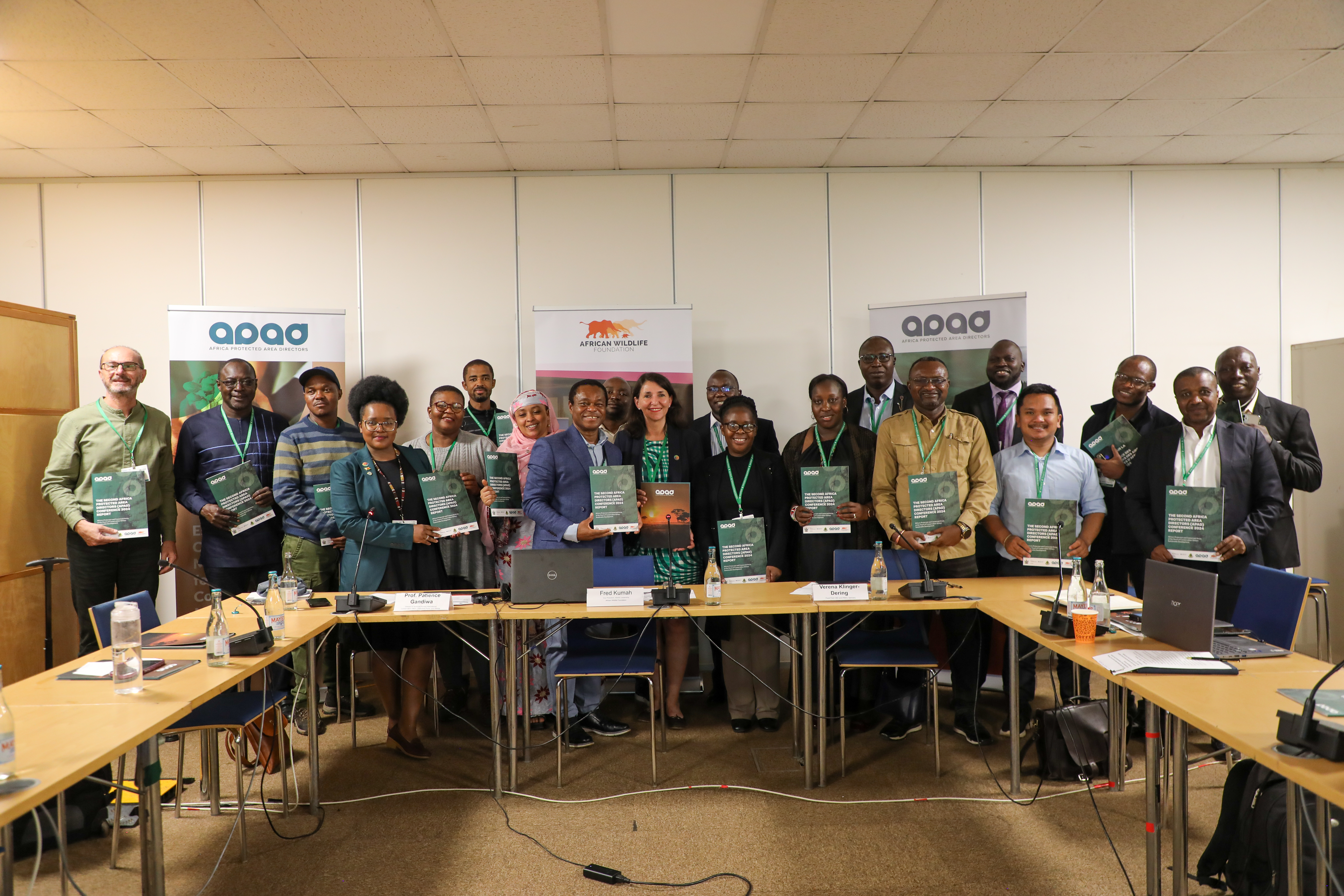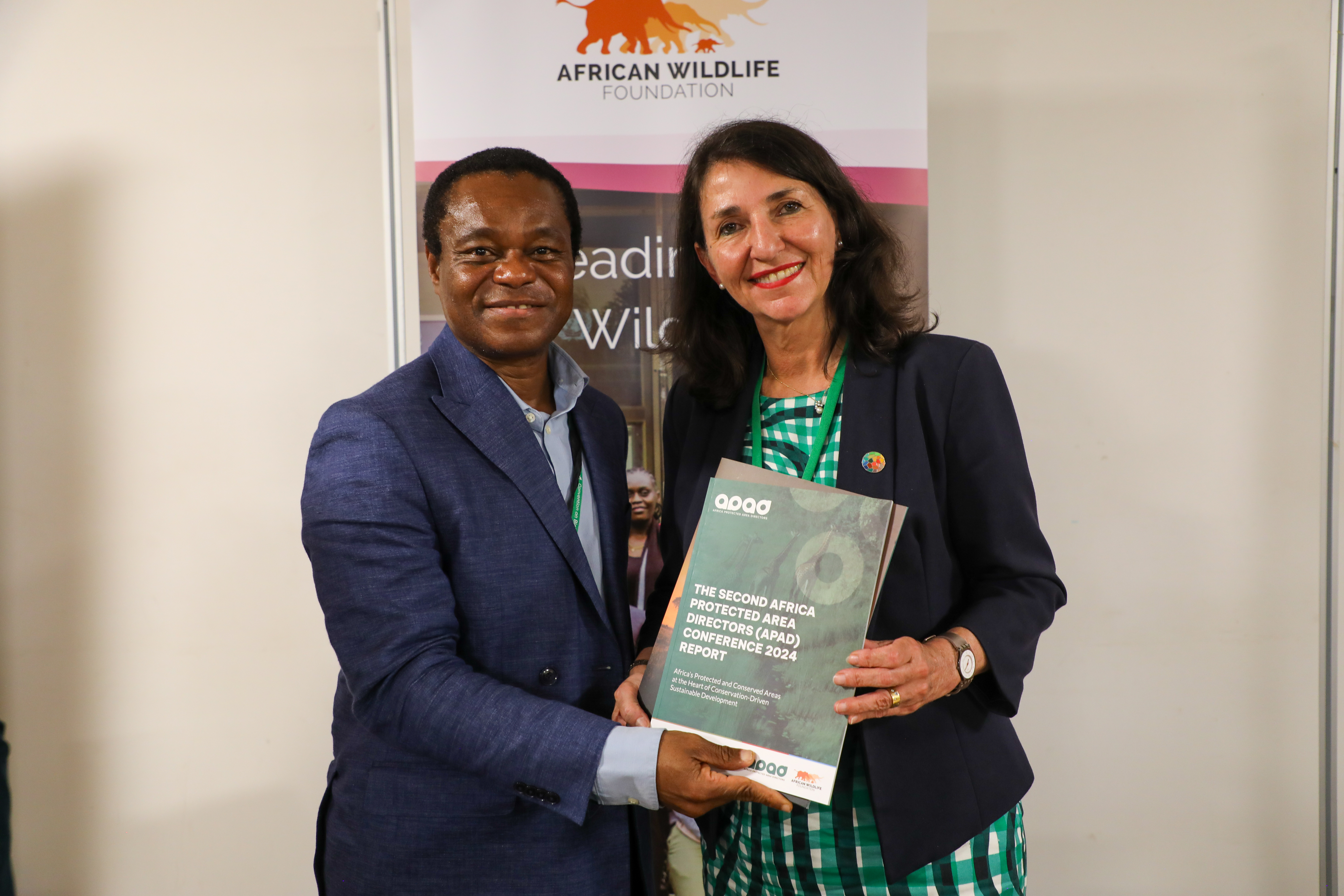Beyond 30x30: Launch of the APAD Report at the 4th Meeting of the Subsidiary Body on Implementation

Group photo during the APAD Report Launch
On the sidelines of the 4th Meeting of the Subsidiary Body on Implementation (SBI) of the Convention on Biological Diversity (CBD), a significant side event titled "Beyond 30x30: Integrating Protected and Conserved Areas into the Implementation of the Kunming-Montreal Global Biodiversity Framework (GBF)" witnessed the launch of the African Protected Areas Directors (APAD) Report. This event underscored the pivotal role of protected areas in Africa's biodiversity conservation efforts, aligning with the GBF targets and addressing critical environmental threats.
Moderated by AWF, Vice President of Global Leadership, Fred Kwame, speakers at the event highlighted the importance of protected areas in Africa for biodiversity conservation. They discussed how these areas are essential in achieving the GBF targets, particularly the 30 by 30 target, which aims to protect 30% of land and sea areas by 2030. The discussions also addressed significant threats such as land use change, overexploitation, and climate change.
Ms. Verena Klinger-Dering, Focal Point CBD and IPBES from Germany's Federal Ministry for the Environment, Nature Conservation, Nuclear Safety and Consumer Protection (BMUV), underscored Germany's commitment to supporting biodiversity conservation in Africa. She highlighted significant German investments in biodiversity governance and the need for transformative changes with a resounding applause for what the directors continue to achieve through the APAD network.

AWF VP, Global Leadership Fred Kumah and Ms. Verena Klinger-Dering, Focal Point CBD and IPBES from Germany's Federal Ministry for the Environment, Nature Conservation, Nuclear Safety and Consumer Protection (BMUV) during the APAD Report Launch
The need for strong institutions for effective protected area management was a recurrent theme, with speakers emphasizing the crucial role of indigenous peoples and local communities in conservation efforts. Policies supporting community-led conservation and genuine collaboration and capacity building were deemed essential for successful conservation initiatives. This issue has been echoed in the corridors over the last two weeks of the ongoing CBD negotiations.
Ousseynou Kassé, Chair of the African Group of Negotiators on Biodiversity, highlighted the growing number of negotiators who also serve as APADs in their countries, bringing them closer to the issues and strengthening the linkages between negotiators and protected areas.
The importance of aligning biodiversity strategies and action plans with regional and continental frameworks was stressed by the African Union Commission representative. This alignment ensures cohesive and coordinated efforts across Africa, enhancing the effectiveness of conservation measures. Sharing remarks from the AUC Director of Blue Economy and Sustainable Environment, Harsen Nyambe, it was clear that the APAD conference's communication has linkages with the Africa Biodiversity Strategic Action Plan, and there is a need for synergies among the Rio conventions and the importance of fostering dialogue, innovation, and partnerships for biodiversity conservation.
Prof. Patience Gandiwa, Director & Technical Advisor for International Conservation Affairs at Zimbabwe Parks and Wildlife Authority, spoke on the importance of protected areas for both biodiversity and livelihoods. She shared insights on the challenges and solutions discussed at the conference and acknowledged how including youth and IPLCs enriched the dialogues even further.
Ahead of the APAD 2024 conference, six African countries—Togo, Zimbabwe, Ethiopia, South Sudan, Malawi, and Nigeria—shared their case studies on implementing the biodiversity plan. Togo's representative, Chamsoudine Afoda, Togo’s CBD focal point, highlighted their initiatives and commitment to advancing biodiversity conservation while learning from the other countries.
The launch of the APAD Report serves as a clarion call for urgent and concerted action to protect Africa's rich biodiversity. By fostering strong institutions, involving indigenous peoples and local communities, youth, and aligning with regional strategies, Africa can make significant strides towards achieving global biodiversity targets. The commitment and collaborative spirit demonstrated at the event offer hope for a sustainable and inclusive future for Africa's natural heritage.
The English and French reports and the case studies can be accessed here: https://apad.africa/resources/